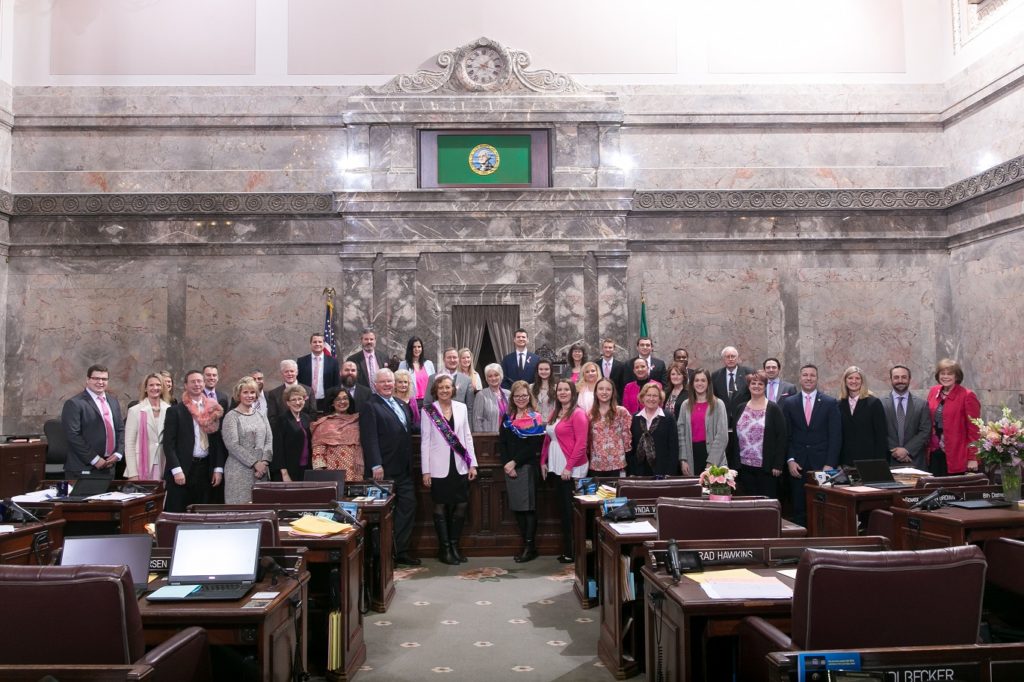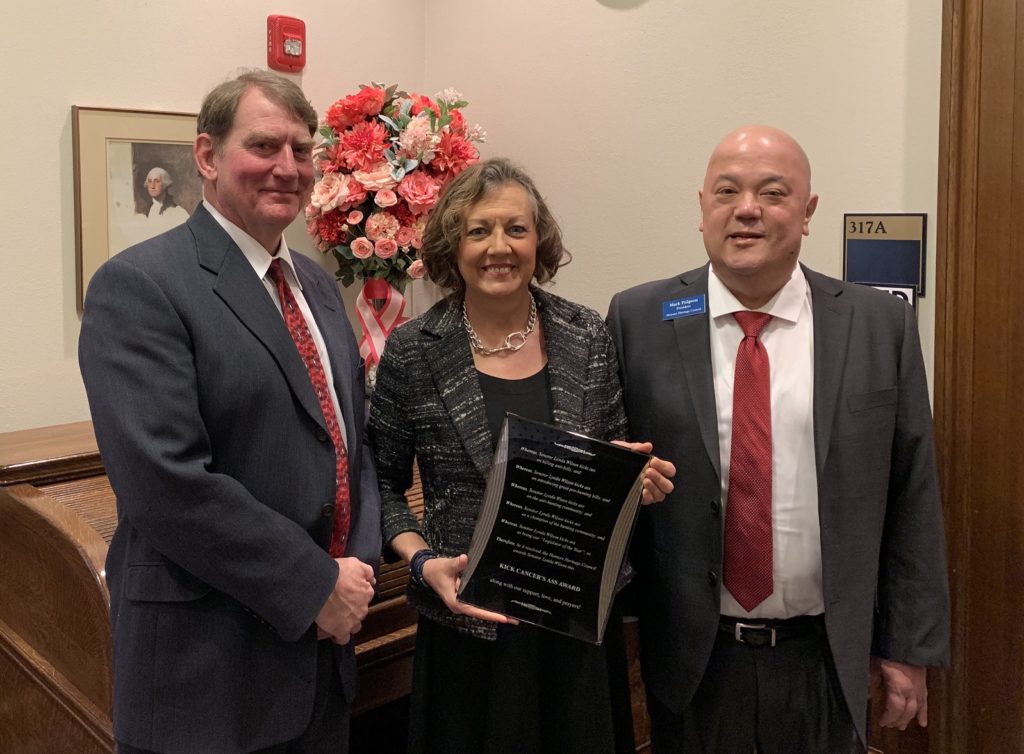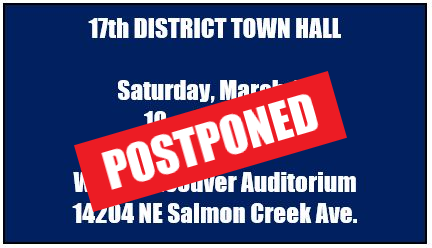As of yesterday, the 105-day legislative session had crossed the halfway mark. We’re at the point where the Senate is choosing which of its bills to send over to the House of Representatives, and vice versa. We do that through what are called “floor votes,” which are cast from our desks on the floor of the Senate chamber, on bills that have come forward from the various Senate committees.
There are five days to go in the 12-day period set aside this year for floor votes. After Wednesday we will return to meeting in our committees, and start looking at the House bills that have been sent over to us.

Members and staff at the Legislature have been wonderful about supporting my #OnWednesdaysWeWearPink effort to raise awareness of the value of regular mammograms and breast self-exams. I wore more pink than usual in this week’s photo – Wednesday was also my birthday!
This morning I learned that while my first round of treatment for breast cancer concluded this past month (the chemotherapy part), my immune system hasn’t bounced back the way my physicians expected. Because the next stage of my treatment is already scheduled in just over a week, it’s essential that I stay as healthy as possible until then, which means limiting my exposure to other people to the extent possible. Unfortunately, that means our 17th District team has decided to postpone the town hall meeting we’d scheduled for March 16.
I feel very strongly about keeping you informed about the issues being discussed and the votes being taken in the Legislature, but for now I’ll have to do that through e-newsletters, e-mails and phone calls instead of in person. I promise we’ll reschedule a town hall as soon as we can, probably in May because the session is set to end April 28.
My ‘Mental Health for Heroes’ bill sails through Senate
As the daughter of an Air Force veteran, I always appreciate the opportunity to support pro-veteran bills. On Tuesday I voted to send Senate Bill 5755 and Senate Bill 5197 to the House. Yesterday, while I had to be away at a medical appointment, the other 48 senators joined to add my Mental Health for Heroes Act, SB 5428, to that list.
My bill acknowledges that the challenges faced by veterans and their families, as they transition back into civilian life, can include unique issues such as mental trauma or post-traumatic stress disorder. It would ensure that veterans attending a four-year university or college in Washington have access to mental-health counseling unique to veterans’ needs.
That means three of my bills have cleared the Senate, with two more poised for a full Senate vote. The latest of my bills to be placed on our voting calendar is SB 5150, my bill to address the lack of proper campus security at Washington’s community and technical colleges.

Two of my friends in the hunting community, Tom Echols (left) and Mark Pidgeon of the Hunters Heritage Council, surprised me this week with a special message from their organization – recognizing my efforts to raise awareness about the early detection of breast cancer. I appreciate it very much!
I’m disappointed that the Senate majority put the brakes on my proposal to exempt feminine-hygiene products from the sales tax (SB 5147). It would have been a compassionate thing to do so that low-income women in particular could get a little bit of support to address what is clearly a medical need. But I’m still working to keep another of my bills moving – SB 5149, aimed at using electronic-monitoring technology to forewarn victims of domestic violence and similar crimes when the perpetrators are nearby.
Why so many tax proposals when state government’s finances are sound?
Economically speaking, things are pretty good in many parts of our state. And a stable, healthy economy means a stable stream of revenue for investing in public programs and services.
Senators who have been on the budget committee longer than me can’t remember another time when the Legislature was in a better position to come up with a new budget that addresses important needs (such as mental-health services and special education in public schools) yet lives within the means provided by taxpayers.
A stable economy and stable tax rates go hand in hand. By holding the line on taxes this year, legislators can give employers reason to keep growing, and hiring. So why are we seeing the majority side propose one tax bill after another? It’s a timely question, because this is the time in a session when work on the three budgets (operating, capital, transportation) moves into the spotlight.
Here are some examples on the table in the Senate:
- Washington’s first income tax (supporters prefer to call it a tax on capital gains; but the IRS views capital gains as income, so in truth, it’s an income tax)
- A 67% increase in the B&O tax on professional services (such as veterinarians and custodians – a cost increase that would be passed on to consumers)
- A higher excise tax on real estate transactions, which will drive up the cost of apartment rents and make a shortage of affordable housing even worse
- An electricity mandate that is functionally a tax and could raise utility bills as much as $35 per month
- a bill on fuel standards that would amount to a 13-cent tax hike on a gallon of fuel
- a new energy tax that would raise the cost of heating and cooling homes
- a new tax on property (as an “impact fee”)
- new taxes on auto parts, rental cars, for-hire vehicles (per trip), bicycles and hybrid vehicles
- a 6-cent gas tax increase (separate from the 13-cent hike above)
- higher fees on vehicle registration, license, weight, motor homes
- a bigger penalty for HOV lane violations
- a woodstove fee increase
- a plastic-bag ban that represents a tax in everything but name.
On top of these direct taxes, my colleagues across the aisle are also positioned to endorse a property-tax increase that could total $2.5 billion statewide. This would undo the limit that was put on local school tax levies in 2017, which finally took full effect this year and has lowered property-tax bills in much of Clark County (and our state as a whole).
To be fair, several of these tax proposals are wrapped into a single transportation-revenue package. The trouble is, the projects linked to that package are mostly found in and around the legislative district of the senator who introduced the legislation (and is chair of the Senate Transportation Committee). Having the whole state pay for those isn’t fair.
Also, some of these taxes were requested by the governor – and one of them was rushed through the Senate this past week, which allowed him to mention it when promoting his run for president. The governor told one national Sunday-morning news program that the timing was “lucky.” That’s not true for the people who would be hit with higher energy costs as a result, and especially not those who would be paying higher rates to subsidize others.
As another Republican senator put it, “the taxes are coming!”
I appreciate the e-mails and phone calls that have come in from the people of our district about that and issues before us. I’m sorry that we had to postpone our March 16 town hall, but I will look forward to seeing you after the session, when we can offer a more comprehensive report.
Yours in service,
To opt out of receiving my periodic updates simply follow these steps: 1) Click here, enter the e-mail address that received the newsletter, click “submit,” and 2) when a new page appears click “delete my account.” You will receive a confirmation e-mail. You may also stop receiving my update by sending an e-mail to my office (lynda.wilson@leg.wa.gov).
Please visit subscriberhelp.govdelivery.com if you have questions or problems receiving my updates. And for more news, click here to visit my legislative webpage.












